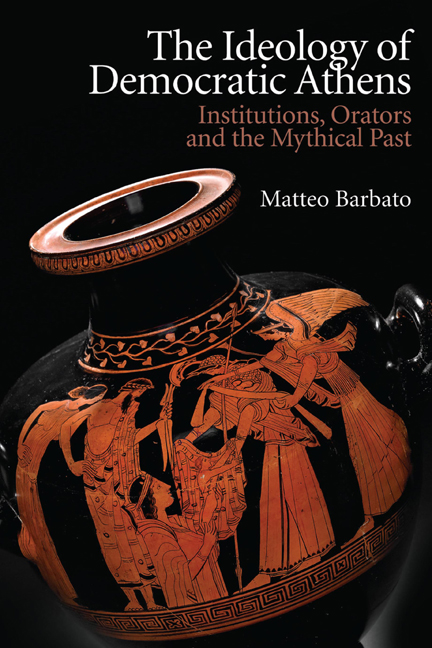Book contents
- Frontmatter
- Contents
- List of Tables and Illustrations
- Preface
- Abbreviations
- 1 Introduction
- 2 Myth and Athenian Democracy
- 3 The Discursive Parameters of Athenian Democratic Institutions
- 4 Exclusiveness and Eugeneia in the Myth of Autochthony
- 5 Between Charis and Philanthrōpia: The Heraclidae
- 6 Fading Shades of Hybris: The Attic Amazonomachy
- 7 Combining Hybris and Philanthrōpia: The Myth of Adrastus
- 8 Conclusions
- Bibliography
- Index Locorum
- General Index
2 - Myth and Athenian Democracy
Published online by Cambridge University Press: 17 October 2020
- Frontmatter
- Contents
- List of Tables and Illustrations
- Preface
- Abbreviations
- 1 Introduction
- 2 Myth and Athenian Democracy
- 3 The Discursive Parameters of Athenian Democratic Institutions
- 4 Exclusiveness and Eugeneia in the Myth of Autochthony
- 5 Between Charis and Philanthrōpia: The Heraclidae
- 6 Fading Shades of Hybris: The Attic Amazonomachy
- 7 Combining Hybris and Philanthrōpia: The Myth of Adrastus
- 8 Conclusions
- Bibliography
- Index Locorum
- General Index
Summary
The Introduction has set out the aim of this book: to overcome the limits of the Marxist and the culturalist approaches to ideology and gain a fuller understanding of Athenian democratic ideology by setting ideology in the context of the institutions of the democracy. I have defined Athenian democratic ideology as a fluid set of ideas shared by the majority of the Athenians as a result of a process of ideological practice achieved by both mass and elite through discourse within the institutions of the democracy. In Chapters 4 to 7, I focus on one particular facet of Athenian ideological practice and explore how the discursive parameters of Athenian democratic institutions enabled the Athenians to construct multiple and compatible ideas and beliefs about their mythical past and their very community.
My approach rests on two basic assumptions. First, the choice of a specific mythical variant as opposed to another can be seen as carrying a distinctive ideological value only if the Athenians were able to appreciate variations in mythical narratives. In the Introduction, I discussed some textual evidence showing that this was the case. This evidence needs to be complemented by an assessment of the mythical knowledge of the Athenians during the classical period in order to demonstrate myth's legitimacy as a source for the investigation of Athenian democratic ideology. Second, I have adopted the principles of the New Institutionalism, which posits that institutions have a strong and conditioning impact on the behaviour of political actors. This hypothesis needs to be checked against the evidence from classical Athens to determine the functioning of the institutions of Athenian democracy and their influence on individual behaviour. In other words, it is necessary to reconstruct the discursive parameters of Athenian democratic institutions and their impact on how individual Athenians acted, talked and discussed the past within these institutions.
While the discursive parameters of Athenian democratic institutions are explored in Chapter 3, the present chapter tackles the issue of the mythical knowledge of the Athenians and shows that myth constitutes valuable evidence for the study of Athenian democratic ideology. I thus review the array of myths employed inside and outside the formal institutions of Athenian democracy, and show that myth was virtually omnipresent in the lives of the Athenians and enabled them to appreciate the ideological value of different mythical variants.
- Type
- Chapter
- Information
- The Ideology of Democratic AthensInstitutions, Orators and the Mythical Past, pp. 24 - 56Publisher: Edinburgh University PressPrint publication year: 2020

